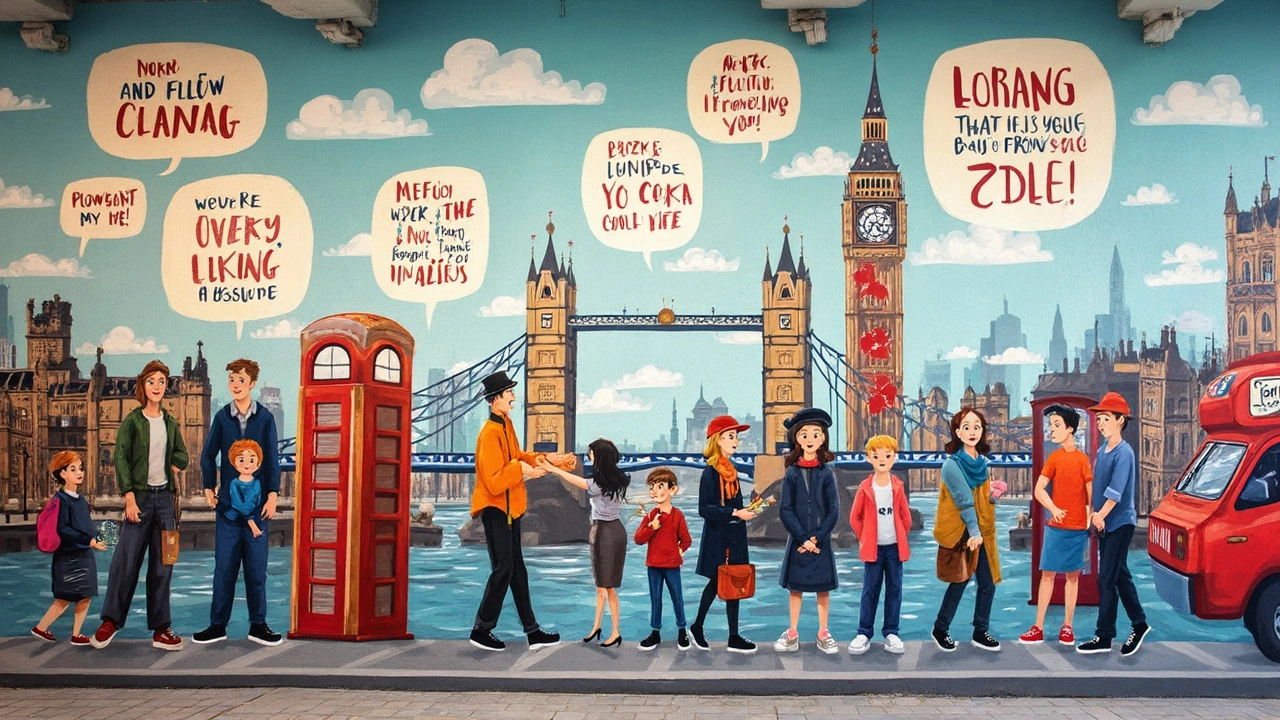
Walk through any London street and pretty soon, you’ll hear words that aren’t in your average English class. When it comes to saying something is cool, Londoners have a few go-to words, but the one that rules 2025 is definitely "peng". You’ll hear it everywhere—from teenagers chatting on a bus, to people hyping up their mate’s new trainers.
Sometimes, you’ll also catch people saying "safe" or "sick" when they mean something is cool, though "peng" is what gets you street credit right now. If you’re aiming to blend in or just want to sound like you know what’s up, drop a quick "That’s peng!" when you see something you like. Just don’t overdo it or you might sound like you’re trying too hard.
- The Go-To London Word for Cool
- Where London Slang Comes From
- How to Use Slang (and Not Get it Wrong)
- Slang Words on the Way Out
The Go-To London Word for Cool
If you're hanging around London right now and want to sound like you belong, you can't ignore the word "peng." This is the top pick for describing something that's cool, attractive, or just plain impressive. You might have seen it fly around on TikTok, heard it while standing in line at Pret, or maybe even from someone gushing about their dinner looking "peng." That's because it's everywhere—used by all ages, though especially by younger crowds.
"Peng" started out just meaning someone attractive, but now it's used for everything: a new pair of trainers, a fresh haircut, even food. If your takeaway looks tasty and you call it "peng," you're in the know. It works as a quick, punchy way to show approval or hype something up. And even though words like "safe" and "sick" are still out there, they play second fiddle in conversations about what’s cool.
Of course, "peng" doesn’t work everywhere in the UK; it’s mostly London and surrounding areas where you'll hear it the most. So if you want to blend in around here, drop a "peng" when your mate shows off their new phone. Here’s how it rolls off the tongue:
- "Those trainers are peng."
- "This burger looks so peng, honestly."
- "Your new haircut is peng, mate."
If someone wants to go the extra mile, they throw in "proper peng" when it’s really cool. Just don’t use it for serious things—no one says, "my dentist is peng." Save it for stuff you’d actually get excited about. And don’t worry about pronunciation; it rhymes with "length" and is super easy to slip into any convo about what's cool in London.
Where London Slang Comes From
London slang isn’t made up on the spot. It grows out of real life—out of everything from immigration, music, and even public transport. What you hear on the streets today is the end result of decades (sometimes centuries) of words mixing from every corner of the world. Think about all the different cultures that call London home. That’s why the slang is so lively—no single group owns it.
Back in the day, Cockney rhyming slang was everywhere (words like “apples and pears” for stairs, or “trouble and strife” for wife). You’ll still find older Londoners dropping these in the East End pubs, but it’s way less common with young people. These days, most of the fresh London slang comes from places like Jamaica, Nigeria, Ghana, and the old British colonies. Once, it all sounded Cockney—now it’s a wild mix.
- Caribbean influence: Words like “peng” and “mandem” come straight from Jamaican Patois and grime culture.
- African influence: Terms like “wagwan” (what’s going on?) and “ting” (thing or girl) come from West African and Caribbean roots. London’s big Nigerian and Ghanaian communities added a ton to the way young people talk.
- Media and music: Grime and UK rap pushed words way beyond London. Artists like Stormzy and Skepta made these phrases huge across the UK.
To give you a sense of how quick slang changes in London, here’s a quick look at the rise and fall of different ‘cool’ words:
| Word | Peaked | Origins |
|---|---|---|
| Peng | 2020s–now | Jamaican Patois/UK rap |
| Sick | 2000s–2010s | Grime/UK youth |
| Safe | 2000s | Urban London |
| Cool | 1950s–present | American English |
Pay attention on the Tube or in schoolyards and you’ll spot new words popping up all the time. Once, my wife Clarissa and I joked about how something gets called “peng” in London but barely anyone north of Watford knows what it means. That’s how local this stuff can get.

How to Use Slang (and Not Get it Wrong)
Using London slang is a bit like knowing when to laugh at an inside joke. If you drop these words at the right moment, you’ll fit right in. But if you go overboard, you might get some sideways looks. There's this tendency for outsiders to mix up words or use them in the wrong setting, especially with slang that actually means something different depending on context. For example, calling your boss "peng" at work? Probably not your best move.
If you want to sound natural, here are a few tips:
- Listen before you talk. Spend some time noticing how locals throw around words like "peng" or "safe"—you’ll get a sense of when and where it's okay.
- Stick to one or two words at first. It's tempting to pile on every new bit of London lingo, but it sounds forced. Keep it simple.
- Use slang with your friends, not everyone. A study by the University of London found that London slang circles mostly around young people and close mates, not formal settings. Older Londoners or strangers could find it weird.
- Always match your tone. If someone’s excited about their new shoes, “Those are peng!” fits. If they're annoyed about the trains, don’t call the delays “sick.”
You don’t want to be that person who just discovered London slang and tries to use it in every sentence. As radio host Clara Amfo put it,
“Slang is London’s heartbeat, but saying it right is about being chill, not textbook.”
So hang back, watch how it’s done, try it out with friends who won’t judge, and soon you’ll find yourself dropping a "peng" in the right spot without even thinking.
Slang Words on the Way Out
Like fashion, London slang moves fast. Words that sounded super fresh a few years ago can suddenly make you look out of step. If you’re still using some of the old classics, it might be time to update your vocab.
Take "wicked" for example. It used to be the top choice for saying something was amazing or cool, but most Londoners under 30 hardly ever use it these days. The same goes for "ace" and "blinding." Back in the ‘90s, these words were everywhere, even in pop songs and football grounds. Now, they’re mainly heard in TV reruns or your uncle’s stories about his clubbing days.
Here's a quick breakdown of London cool slang words that are fading out:
- Wicked: Now mostly nostalgic or used jokingly.
- Ace: Rare outside of older crowds.
- Blinding: Feels old-school to most teens.
- Buff: Used to mean attractive, but "peng" has taken over big time.
- Pukka: Jamie Oliver helped this one go mainstream, but now it just sounds dated.
There’s data to back this up. According to a survey by London Youth Trends in 2024, only 7% of teenagers used "wicked" in the last year. Compare that to "peng," which clocked in at 53%. Here’s a quick look:
| Slang Word | 2024 Teen Usage (%) |
|---|---|
| Wicked | 7% |
| Ace | 4% |
| Peng | 53% |
| Pukka | 2% |
| Buff | 5% |
If you want to sound up to date, ditch the words above and stick with the newer options. London slang is all about staying current. Stay sharp—old favourites can come back around, but for now, save them for fancy dress parties or winding up your mates.